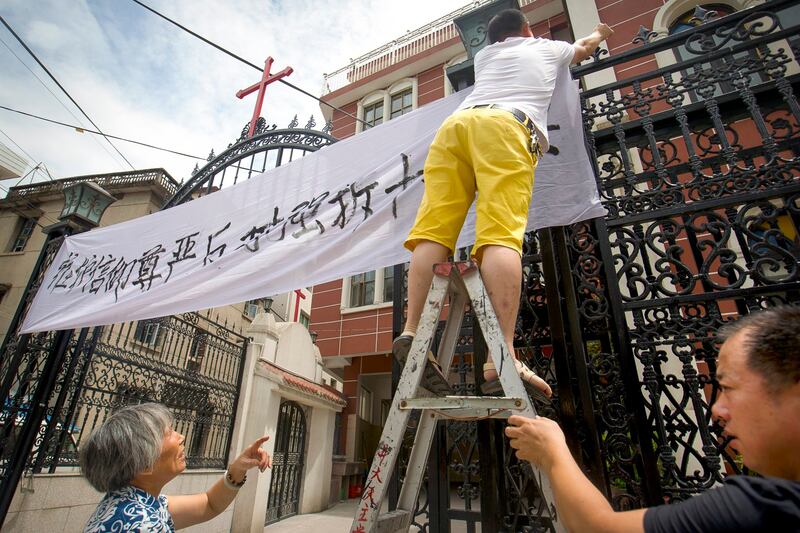Chinese authorities continue to arrest “thousands” of people a year for practicing their faith in ways that undermine the primacy of the Chinese Communist Party, a new U.S. State Department report says.
Released by Secretary of State Antony Blinken on Wednesday, the 25th annual Report on International Religious Freedom says China's constitutional guarantees to religious freedom are obstructed by regulations that "require clergy to pledge allegiance to the CCP."
The report says Chinese authorities have recently begun a campaign to enforce those regulations, after a September 2023 “administrative measure” was issued that requires religious centers to fall into line.
Under the measure, all places of worship must "uphold the leadership of the CCP, implement ' Xi Jinping Thought on Socialism with Chinese Characteristics,' and promote the 'Sinicization' of religion," it says.
Those who do not comply are “tortured, physically abused, arrested, disappeared, detained, sentenced to prison, subjected to forced indoctrination in CCP ideology,” the report adds, noting that charges or accusations against the faithful are often “vague or insubstantial.”
A “lack of transparency” from Chinese authorities makes exact arrest and imprisonment numbers impossible to discern, it continues, but “estimates of those imprisoned during the year [2023] for their religious beliefs ranged from the low thousands to more than 10,000.”
A little more than half of Chinese are atheist or religiously unaffiliated, the report says, while 18.2% of the population identify as Buddhist, 5.1% as Christian, 1.8% as Muslim and 21.9% follow folk religions.
Only five religions – Buddhism, Taoism, Islam, Protestantism, and Catholicism – are officially recognized in China and allowed to openly be practiced, which must be done under the banner of corresponding state-sanctioned groups closely monitored by the authorities.
Worldwide decline
Speaking at the launch of the report, Blinken noted a recent Pew survey that found worldwide religious freedom was at its lowest ebb since the polling company began tracking the issue in 2007.
He noted that the United States was not immune from the issue.
“Since Hamas’s horrific terrorist attack on Israel on Oct. 7, and the subsequent conflict in Gaza, both anti-semitism and Islamophobia have increased significantly across the globe,” Blinken said.
“Here in the United States, reports of hate crimes and other incidents targeting both Muslims and Jews have gone up dramatically.”
But he said official repression of religion was different, and pointed China's ramping up of forced Sinicization of Tibetan Buddhists and the " genocide and crimes against humanity that China is committing against the predominantly Muslim Uyghurs in Xinjiang."
The campaign is part of a broader campaign to force non-Han Chinese to assimilate into what Beijing considers to be mainstream culture: Chinese authorities in the past year have, for instance, banned Tibetan students speaking their native language and prohibited them from taking private classes outside the state-run schooling system.

Rashad Hussein, the U.S. ambassador at large for international religious freedom, told the launch that the campaign against the Uyghurs “follows decades of persecution of religious communities, from Tibetan Buddhists, to Christians to Falun Gong practitioners.”
Hussein noted the crackdown against Falun Gong, which Beijing considers a cult and is now headquartered in rural New York, took place 25 years ago, with many adherents fleeing from China.
“We now even see [China] attempt to reach across its borders to target individuals and silence critics, such as the reports of Chinese authorities engaging in transnational repression against predominantly Muslim Uyghurs, Tibetans, Falun Gong and many more,” he said.
He noted a similar phenomenon was taking place in Myanmar, where the military junta is increasingly targeting the Rohingya Muslim minority in the country's east as well as those practicing Christianity.
Liu Pengyu, a spokesperson for the Chinese Embassy in Washington, called the accusations in the report inaccurate and accused the U.S. State Department of trying to interfere in domestic Chinese affairs.
“The Chinese government protects citizens’ freedom of religious belief in accordance with the law. People of all ethnic groups in China are fully entitled to the freedom of religious belief as prescribed by law,” he said, adding that China has “nearly 200 million religious believers.”
“We urge relevant parties to stop using the so-called religious issues to meddle in China’s internal affairs,” he said.
Edited by Malcolm Foster.
